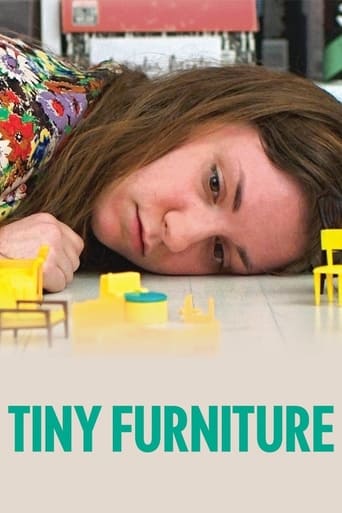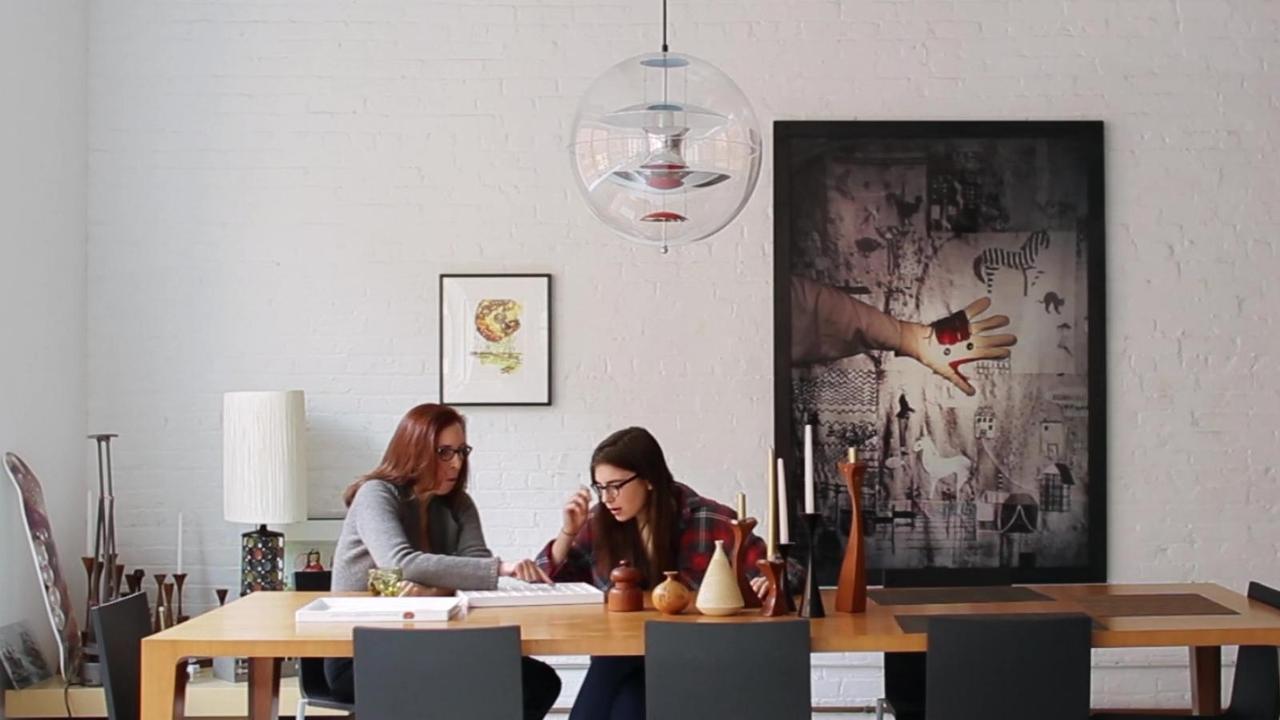Movie_Muse_Reviews
The saga of the Millennial college graduate who moves back home and begins a maddening search for direction — that's what Lena Dunham sets off to depict in "Tiny Furniture" and she does it in the most Millennial way possible: completely DIY including casting her mother and sister to play — her mother and sister.Dunham captures the mundanity of post-undergrad life at home, even though her character Aura's life is a little more unusual; home is a Manhattan loft where mom (Laurie Simmons) is an a photographer/visual artist (she actually is in real life) of solid notoriety. Sister Nadine (Grace Dunham) lives there too, but she's in the no-pressure zone of high school. There isn't so much a plot synopsis as a list of friends new and old and other influences who make Aura's new life as a young adult and dreams of becoming a successful artist complicated and messy.The authenticity of Dunham's voice as a writer rings clear. A lot of it is the semi- autobiographical form; it's impossible for any peers watching (and maybe some a little older) not to relate in some way to Aura's "struggle." It might be nice if more stuff happened in the film instead of a whole lot of stuff that could be stuff but doesn't ever become stuff, but there's also something refreshing about taking it in as a contemporary portrait of an emerging generation. Also, you could argue that there's a certain poetic truth to the fact that nothing really happens.The "action" is how Aura navigates internal and external pressures. Everyone around her, for example, seems to have found a measure of success. Her mother, for one, has been successful forever; she meets a successful-ish YouTube star in Jed (Alex Karpovsky) who's talking to networks about a TV show and even her sister was recognized nationally for her poetry, which Aura can't help but demean. Then there's her oldest childhood friend, Charlotte (Jemima Kirke, Dunham's actually oldest childhood friend) who sports the couldn't-care-less attitude that plays in contrast to it all.Aura's first foray into the "real world" involves getting a job, since that's what people are supposed to do, but of course being a daytime closed-hours hostess at a restaurant is a far cry from her aspirations, even though she seems to believe its in her best interest. Throughout the course of the film, Dunham exposes a bit more of Aura's psychology, namely the complex nature of her relationship to her family and home in the specific and broadest sense. Done for as low a budget as possible, the actors here are all amateurs but it doesn't show. Dunham's strength is obviously her writing, but she's a sufficient stand in for the average 22-year-old, and as a director, she makes the most of it with some interesting shot framing to bring varying perspectives to the talk-heavy action."Tiny Furniture" is a really impressive debut for a fledgling filmmaker, especially one whose talent is writing and simply needed to round up a cast and crew to realize her story into some kind of finished product. It could certainly use a plot, but Dunham is able to effectively touch on the melange of post-college emotions in the 21st century in a way that's yet to be articulated, and which she effectively continued to expound upon in her HBO series "Girls," which this movie made possible. Dunham recognizes the complexity of her generation. There is a self-centered component, there's a familial dependency, but there's also a mixed bag of influences and life philosophies that can take hold of the wheel at any moment. We are pitiable and pitiful, lost yet driven, naive and all too aware of how the world works.~Steven CThanks for reading! Visit Movie Muse Reviews for more
Richard Lee
you have to watch this film through the eyes of a woman... it is the plight of an average looking woman in a world full of attractive people... she is constantly overlooked, used, and abused because both men and women do not find worth in her because of her average looks... in addition, she is attracted to attractive people both men and woman because of their attractiveness... this basic concept, i believe is overlooked in most of my observations in the reviews that have been posted about this film... the film is beautifully filmed with great set design... the dialogue is realistic... the set design is believable... it is painful to watch because it teaches us what our modern society values in men and women...
tieman64
Directed by Lena Dunham, "Tiny Furniture" stars Dunham herself as Aura, a young woman who returns from college to her family home. She's returned with nothing but a film studies degree, a broken heart and a lack of direction. At home Aura mingles with many adolescents in a similar situation, and her mother, who is a successful artist.Whilst there is very little overt humour in the film, "Tiny Furniture" is nevertheless a satire of sorts, Dunham taking aim at the narcissism of both contemporary youths and a certain subset of pretentious, artsy-fartsy, liberal hipsters (all white and born of privilege). It's an insufferable film about insufferable people who talk about and do insufferable things. But that's the point.Somewhat autobiographical, the film was also made at that point in Dunham's own life immediately prior to the moment in which she slid from aimless, awkward kid to successful artist with her own HBO franchise. In its contrasts between a once wayward but now successful mother and her currently wayward daughter, the film foreshadows Dunham's own real-life rise. The film's not contemptuous of self-absorbed artists who take "pictures of tiny furniture" and "miss the forest for the trees", but rather sees adolescent self absorption, silly experimentation (Dunham's sexual escapades, her lame home movies etc) and private suffering as a kind of phase, a necessary step in perhaps becoming something better.What the film also unintentionally captures is the vacuity of late capitalism. Dunham's young adults hang suspended in limbo, aimless and lethargic. This has led to some viewers chastising them, denouncing their sense of entitlement (Dunham refuses to work in a coffee shop), their unwillingness to "get with the program" and "get a useful job". But with the adult world long discredited, and no viable alternatives apparent, the inability of these kids to function is wholly understandable. It's no coincidence that a rise in mental illnesses correlates with post-Fordist capitalist modes of production. Today, as much as 27 million Americans are on anti depressants. This dangerous individualizing and medicalizing of blame (ie the suffering of modern kids is "all their fault", is a "biological" problem etc) serves only to deflect away from the social causation of mental illness; it is the social sphere that is becoming increasingly toxic (humans are also becoming depressed, on average, at far young ages). We see glimpses of this in Dunham's film, kids pushed to choose irreversible life paths, groomed to be well oiled, productive machines, struggling with full time jobs, social expectations, debts, and of course conflictions over their inability to both follow passions and survive. "What do you do?" is the buzzword of this culture, a term which reveals a lot about society's obsession with work and jobs, obsessions which go so far as to shape the way we think, speak and base our identities. Maybe nobody can escapes this - continual is the cultural conditioning; a mythology which functions only to preserve the status quo – but it is the creative human beings who tries to. Who questions cultural assumptions and tests that which we take for granted throughout our lives.Aura, of course, doesn't explicitly question anything, and may in fact blossom into a quite mediocre artist, but the point is that she is anxious precisely because of these social pressures. Some have called her a narcissist, but narcissism often stems from oppression which in turns spurs the ego to compensate. Philosopher Christopher Lasch called narcissism "the fear of the emptiness that lies at the core of consumerism", but it goes beyond that. Personal gratification is the driver of both narcissism and late capitalist consumerism, which are two sides of the same coin. Consumerist marketing glorifies "projected selves" as "true selves", encouraging self-absorption even as it erodes identity, self-esteem and the resilience which enables emotional growth. The failure to attain projected ideals, or the drive to attain them, of course then leads to a myriad of anxieties. As the subject is overly dependent on socioeconomic signifiers and the approval of others, narcissism and insecurity only balloon further. Dunham's characters aren't only stuck in post graduate delirium, stuck in quarter life crises, but are essentially being pushed into self promotion, solipsism and competition; market yourself or drown.7/10 - Worth one viewing.
curtis martin
First, let me say that, technically, this was a very well-made film. It is amazing to me that a first time filmmaker could create something this professional with only $50k. It looked and sounded like a real movie, and the acting ranged from OK (as in the lead actress/director/writer) to excellent (Jemima Kirke as the wacky friend). An excellent effort for a first timer.So, with that caveat out of the way, let me say this: I just don't like films about spoiled, whiny, wealthy white kids who can't figure out what to do after college. It's a world I (a) don't "get" and (b) don't care to "get." I mean, maybe the pointlessness of that kind of life was the point of the film—but I can't honestly say for sure because the movie seems to be as listless as its main character. There are a few funny moments (all from Ms. Kirke), but there's also an awful lot of staring into space.



 AD
AD




